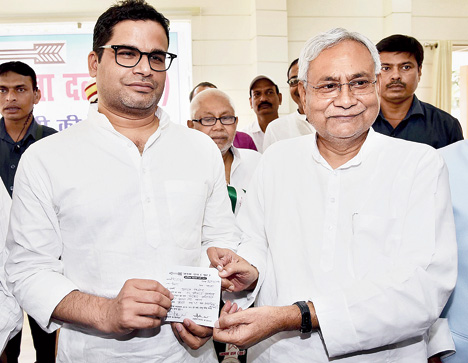
New Delhi: The art of the political cartwheel has made Patna its stage again. Strategist Prashant Kishor, who joined the Janata Dal United on Sunday and announced his "new journey from Bihar", is as adept and frequent a fence-hopper as his boss and Bihar chief minister, Nitish Kumar.
The near-incredible trapeze loops the two men have enacted over the last several years may, in fact, have evoked a special sense of kinship.
The journey Nitish Kumar has charted since 2103 runs thus: NDA to belligerently anti-NDA and anti-Narendra Modi; thereon to embracing
Lalu Prasad and the Congress; thereon to ditching both overnight, resurrecting his marriage with the BJP and turning Modi fanboy from Modi-baiter.
Prashant Kishor's political somersaults have been no less recurrent or unabashed.
Beginning with Modi's Gujarat Assembly campaign in 2012, he came to devise the strategy for his power-run to prime ministership in 2014; thereon, he shifted to then arch-rival Nitish Kumar, and played bridge for the JDU-RJD-Congress Mahagathbandhan which rebuffed Modi's Bihar grab in 2015; thereon he moved to Delhi and entered the Congress backrooms; he was part of a miserably failed bid on Uttar Pradesh in alliance with the Samajwadi Party but made a success of the Congress' return to power in Punjab; thereon, during a long lull mulling what to do next, he retreated to a shell from where he simultaneously probed future possibilities with both the Congress and the BJP.
In his first public interaction at Hyderabad's Indian School of Business (ISB) last week, where he announced his decision to give up political consultancy, Kishor agreed he was in touch with both Congress president Rahul Gandhi and Prime Minister Modi and BJP president Amit Shah.
But as recently as the ISB event, Kishor scoffed at a direct question on whether he was joining politics. "There will be speculation... the media speculates all the time, I have lived with this for the last six years. Today media is speculating that because I have chosen to speak publicly for the first time, there must be a reason. I can tell you the media will be wrong again.... I am telling you I have worked with big leaders enough, I want to work with people at the grassroots now...."
Pushed by repeated questions at the same event on his political ideology and how he could work for bitterly adversarial camps, Kishor had said: "I am not a gun for hire, I have never been. If I were to really define myself in ideological terms I would choose the western term Centre-Left... but I should also add that you can have an ideology but you should not be blinded by that ideology."
This is the sort of non-committal flexibility that sets Kishor rather comfortably into Nitish Kumar's precincts. An avowed Lohiaite Socialist, Nitish has found himself seamlessly comfortable in the company of both the Congress and the BJP. He shunned the BJP in 2013 and called for a "Sangh-mukt Bharat"; four years later, he was back as outspoken ally of the Sangh company.
Kishor would have meditated long on his move from the backrooms to the front office of politics. Those with a sense of how he works cannot be surprised he chose neither the BJP nor the Congress for his debut despite knowing, and having worked with, bosses in both parties closely. Both are huge and established parties and may not have offered the kind of operating room Kishor imagines for himself.
Nitish's JDU is a contrast - it has one leader and no real other to speak of; Nitish's confidence alone can give Kishor a platform he wouldn't be served elsewhere. Besides, it gives him an opportunity to open his public life in his home state.
By association with Nitish, Kishor has located himself firmly in the NDA camp and some have begun to suggest he will tangentially end up doing for Narendra Modi in 2019 quite what he did for him in 2014. But Nitish and Kishor have repeatedly displayed they are possessed of both political caprice and cunning. A note of caution on the certainty of their future may be in order. It is lost on no political player of any worth that Kishor - and probably even Nitish - remains in meaningfully close touch with both the BJP and Congress brass. Both are inveterate believers in the craft of what's politically possible.
On an individual note, it is also beginning to be volubly suggested that Kishor is now the Number Two man in the JDU and, therefore, in Bihar's ruling establishment. Moves during days to follow will reveal if and how this de jure ranking is turned to de facto reality. Kishor could become potentate in both party and government - a high organisational seat by appointment to Nitish himself, and probably also a clutch of significant ministerial responsibilities.
Doubtless, Kishor's high-profile induction has taken many in the JDU not merely by surprise but also by their nerves. Kishor's entry has already left part of the aspiring JDU hierarchy disrupted and should he assume his speculated high station, greater disruption will follow.
On the other hand, party ranks may feel enthused to see an eager-beaver like Kishor, who has a reputation for energy and getting things done, at the front. Nitish Kumar's cryptic remark on Sunday that Kishor "is the future" is key to what is in the works.
Kishor himself is no man to set his ambitions low; he revels, in fact, in punching above his weight. But if he has arrived on the scene with long-term political ambitions in his home state, he may have to wrestle with default deficits. He is a Brahmin in a highly Mandalised polity; the last of his kind to embrace the chief minister's chair was in 1989.










